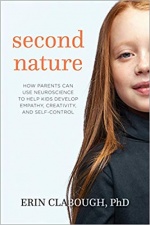|
Quote of the Week
"The person who masters himself through self-control and discipline is truly undefeatable." -- Buddha

How Neuroscience Can Help Your Kid Make Good Choices

Imagine the following scenario: Your eight-year-old son is repeatedly poked with a pencil by his classmate at school. How does he respond? He might endure the pokes without complaint by using willpower, or he might stay silent, succumbing to feelings of fear or powerlessness. He could lose his self-control and act out, attacking his classmate verbally or poking him back. Or does your son “self-regulate” by considering his options and resources, taking stock of his feelings and strengths, reflecting on past experience, and responding deliberately? Self-regulation may sound like a tall order—but it’s also the best choice, according to Erin Clabough, a neuroscientist, mother of four, and author of the book Second Nature: How Parents Can Use Neuroscience to Help Kids Develop Empathy, Creativity, and Self-Control. Self-regulation is a skill that we need whenever we want to make a good choice or work toward a goal, especially when strong feelings are involved—in ourselves or others. This week's featured article from Greater Good Magazine describes how parents can help children cultivate empathy, creativity, and self-control, and more importantly why they should. Together these qualities support a child’s ability to self-regulate in a balanced way, leading to greater personal fulfillment, better relationships, and enhanced success in life.

Reading Corner
 Title: Second Nature: How Parents Can Use Neuroscience to Help Kids Develop Empathy, Creativity, and Self-Control By: Erin Clabough Title: Second Nature: How Parents Can Use Neuroscience to Help Kids Develop Empathy, Creativity, and Self-Control By: Erin Clabough
Recommended Ages: All
"Neuroscientist and mother Erin Clabough teaches that to thrive as adults, children need to learn self-regulation, a master life skill founded in empathy, creativity, and self-control. The lack of even one of these intertwined skills underlies nearly all of the parenting problems we face. The good news is that you can build these strengths in children at any age, from infancy to adulthood. Here, using key insights from brain development research, you'll learn how. With scientific depth and in clear language, Erin gets you up to date on the vast tide of emerging neuroscience discoveries and how they can help you parent better. Practicing these skills requires a new mindset, but "second nature" parenting is low effort and high impact. It only takes a few minutes each day to nurture the skills your kids need, simply by using everyday situations that you're already facing in a different way." --Publishers
Recommended by Kindful Kids Editors

Be The Change
This week, try out one or more of the six games described here to foster self-regulation in your child and have some low-tech fun as a family!

Kindful Kids newsletter is a resource for parents who are keen to teach children about compassion and service. It reaches 4,023 subscribers. You can unsubscribe here.
|